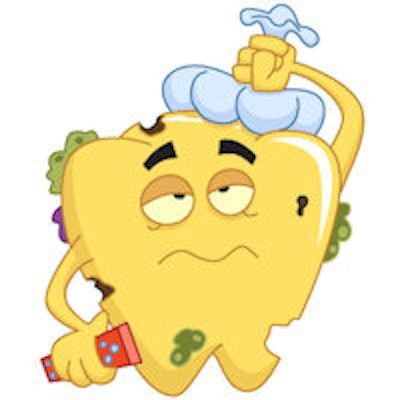
Benzocaine has been used to treat pain for more than a century, but the available data about its efficacy for the relief of tooth pain have long been lacking, prompting the U.S. Food and Drug Administration (FDA) to assign it category I status as an external anesthetic or analgesic for the temporary relief of a number of oral issues, including minor dental procedures, dentures, orthodontic appliances, canker sores, and teething -- but not tooth pain.
Instead, the FDA concluded that the available data were not adequate to establish the effectiveness of benzocaine for the temporary relief of toothache pain and assigned it category III status for this indication. Knowing that the FDA would likely recategorize benzocaine for tooth pain if provided sufficient data from well-controlled studies, 19 researchers at nine research centers set out to do just that.
Their results, published in the Journal of the American Dental Association, were definitive in terms of efficacy and safety (May 2013, Vol. 144:5, pp. 517-526). "Both 10% and 20% benzocaine gels were effective in the temporary relief of toothache pain and were well tolerated," the researchers wrote. The stronger dose also acted more quickly.
The study yielded excellent dose-dispensing results as well. Most participants were able to correctly self-apply doses of benzocaine that were at least tenfold below the reported threshold that could lead to methemoglobinemia, the study authors noted. While rare, methemoglobinemia is a concern in children, so much so that the FDA issued a warning in 2011 about treating kids with benzocaine.
For this study, the researchers tested benzocaine's effectiveness on teeth and soft tissue in double-masked conditions with 576 participants, 100 of whom were minors. After screening them for open caries, periodontal abscesses, the use of short- or long-acting topical or systemic analgesic agents, or contraindications to benzocaine, the researchers randomly assigned the participants a polyethylene glycol vehicle gel (control) or 10% or 20% benzocaine.
Dosage compliance was determined by weighing the tube of test material immediately before and after the participants had read the instructions and applied it with their fingers. Next, they were asked to rate their pain intensity using the dental pain scale and pain relief on a scale of 0 (no relief) to 4 (complete relief) at five-minute intervals during the first 30 minutes and 10-minute intervals from 30 minutes through 120 minutes after application.
The researchers noted when pain relief onset was signaled by the participant hitting a button on a stopwatch. Participants were also asked to indicate when they experienced "meaningful relief."
"Participants completed a five-level ordinal global satisfaction assessment scale used frequently in postsurgical dental pain studies at the conclusion of the 120-minute evaluation period or at the time they dropped out of the study owing to inadequate pain relief," the researchers explained. Then the participants rated their experience as poor, fair, good, very good, or excellent.
The researchers found that both 10% and 20% benzocaine gels were statistically better than the vehicle gel (p = 0.038 and p < 0.001, respectively) with regard to pain relief. They also observed a dose-response relationship: The 20% benzocaine group had 7% more responders than did the 10% benzocaine group (p < 0.047).
In addition, the stronger dose of benzocaine had a more rapid onset of perceptible relief (p = 0.03) than the weaker dose. The two test groups had nearly identical satisfaction responses: 79% of the 20% benzocaine group and 80% of the 10% benzocaine group said that their satisfaction was "good" or better, compared with 61% of the placebo group.
"To our knowledge, our study is the first with results demonstrating a dose response between the 10% and 20% benzocaine treatments," the researchers noted. Their findings, they concluded, support the need for both formulations.



















